January 20, 2025
Gold Up as Inflation Offsets Geopolitics
Author - Ben McGregor
Gold rises as inflation concerns overshadow geopolitical risk drop
Gold rose 1.2% to US$2,740/oz as the upward driver of inflation concerns, after December 2024 US CPI data came in hotter than expected, overshadowed the downward pressure on the metal from a major decline in geopolitical risk.
Canadian gold’s major drill results for past three months
This week we look at the top drill results for Canada’s major gold producers and developers and larger juniors over the past few months using data provided by Mining Hub, and the mixed share price performances of these stocks over this period.


Gold Up as Inflation Offsets Geopolitics
Gold rose 1.2% to US$2,740/oz, its highest level in three months and heading again
towards all-time highs. This week was a key test for the two main forces that we
expect to affect gold this year, an ongoing monetary expansion and geopolitics, with
major news for both. The decline in gold that we would have expected from the
ceasefire in Gaza, given that we estimate about a US$200/oz or more premium in the
price from this conflict (with another US$200/oz or more from the Russia-Ukraine war,
with both based on gold’s moves after these situations began), did not occur.
One reason gold may not have dropped on the news is that the market may be
viewing the resolution as still tentative. However, we could assume that the premium
in gold for this conflict did decline to a degree, and that there had to be a major factor
strongly offsetting the drop in geopolitical risk. This was likely from the monetary side,
with US CPI data surprising to the upside and increasing fears of an extended inflation
resurgence this year. US headline CPI inflation rose for the third consecutive month
to 2.86% and core inflation was 3.25%, having roughly flattened for the past six
months but holding stubbornly flat about 1.0% above the Fed’s 2.0% target.
The reaction in equity markets seems to have been the opposite of that for gold, with
the effects of the ceasefire outweighing rising inflation concerns, and the major
indices soaring. The S&P jumped 3.7%, although in contrast to much of last year, this
was not driven mainly by mega-cap tech, with the Nasdaq rising just 1.5%, and small
caps having a much bigger role, with the Russell 2000 up 4.6%. The gold stocks did
reasonably well given the rise in the metal and equities, with the GDX of large
producers up 2.2% and the GDXJ of junior miners rising 1.5%, although the latter
looked a bit weak in the context of the outsized gains for small caps overall.
Top recent drill results from Canadian major gold producers and juniors
This week we look at the top drilling results for the Canadian major gold producers
and mid-sized juniors. This is based on data from Mining Hub, which provides a range
of information on global mining companies including drill results and news which can
be screened using several metrics including market cap, metal, country and region,
date and others. We have focused on the strongest results for Canadian gold
companies since October 2024 ranked by grams-thickness, which is the grams per
tonne of gold (g/t Au) multiplied by the width in metres (m).
While we included only companies with a reasonably sizeable market cap, with nearly
all above CAD$100mn, there are several junior miners with smaller market caps that
have also seen exceptional results over the period. These include Sun Summit
Minerals, Golden Cariboo, Galway Metals, Emperor Metals, Scottie Resources,
Endurance Gold and Cassiar Gold.
Alamos, B2Gold and Iamgold post strongest recent drill results of Big Gold
Many of the top drill results come from Big Gold’s second tier, a group of large gold companies with market caps just below the big three, Newmont, Barrick and Agnico- Eagle. These include Alamos Gold, with a market cap of CAD$11.9bn (Figure 4), with by far the strongest drill result in terms of grams-thickness for both Canadian and global gold, at 3,973 from its Island Mine (Figure 5). This comprises an extremely high 584.2 g/t Au grade over 6.8 m. The two next best results are also from mid-tier Big Gold, with B2Gold reporting a 672 grams-thickness from its Back River mine, with a 29.5 g/t Au over 22.8 m, and Iamgold with a 635 grams-thickness of 2.7 g/t Au over 235 m from its Cote Gold mine.
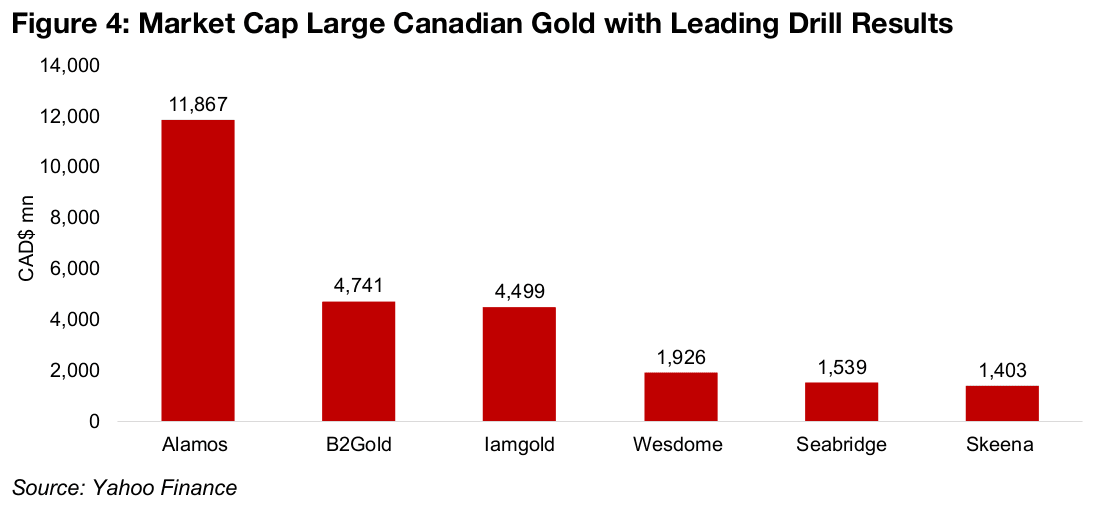
As all three of these companies operate several large mines, a single outstanding recent drill result is often not enough to move the share price much, given a potential large range of other significant offsetting drivers. There can also be a situation where a pattern of previous strong results have led the market to expect, and already price in, a continuation of the successful trend. This sets a higher hurdle for reported drill results to substantially drive up share prices. Of these three companies, only Iamgold has seen a strong share price rise since October 2024, up 12.4%, while Alamos rose just 3.6% and B2Gold declined -25.2% over the period (Figure 6).
Wesdome, Seabridge and Skeena report outstanding drill results
There have also been outstanding drill results since October 2024 from Wesdome,
Seabridge and Skeena, which only have one or two major projects each and therefore
smaller market caps than mid-tier Big Gold. Wesdome has two producing mines,
Eagle River, and Kiena, with its strong recent drill result from the latter, a 242 grams-
thickness with 63.6 g/t Au over 3.8 m. While this result from January 13, 2025 may
have partly driven its 9.4% share price gain since October 2024, the rise in the gold
price this year will also have been a factor.
Seabridge has one of the largest gold resources in the world, with two Pre-Feasibility
Stage Projects, KSM and Courageous Lake with 50 mn oz of reserves, while KSM
also has 19.6 bn lbs of M&I copper resources. However, its major drill result has not
come from these two projects, but rather one of its smaller exploration projects, Iskut.
While a 255 gram-thickness was reported, the result was relatively low grade, at 0.48
g/t Au, over a high width of 531.5 m, and seems to have done little to curb Seabridge’s
struggling share price, down -25.2% since October, the worst performer of the group.
Similarly, the strongest drill result from Skeena Resources, a 271 grams-thickness,
with 0.71 g/t Au over 381.5 m, has come from its smaller KSP exploration project, not
its flagship Eskay Creek project, which is at the Feasibility Study stage. The company
has had the strongest performance of the group since October 2024, up 17.9%.
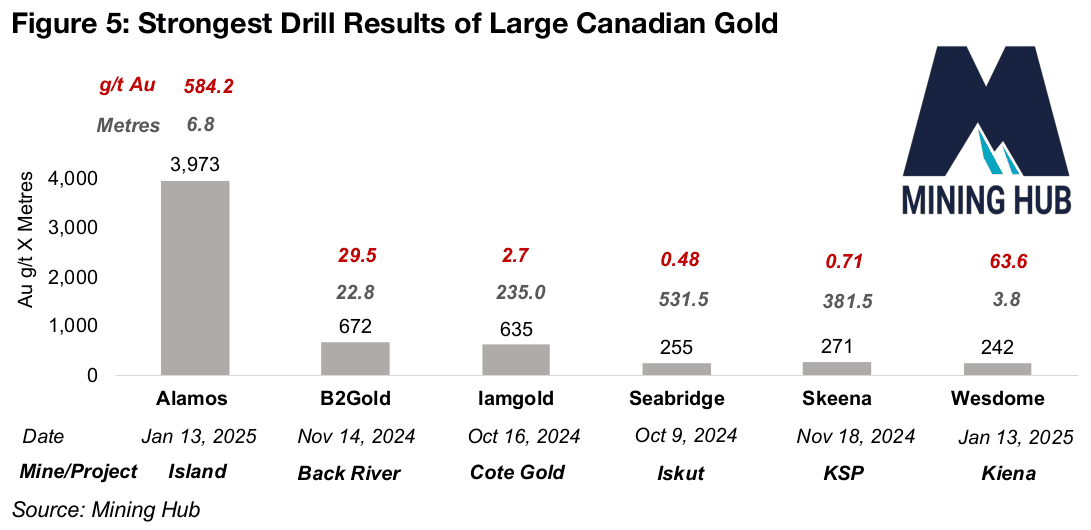
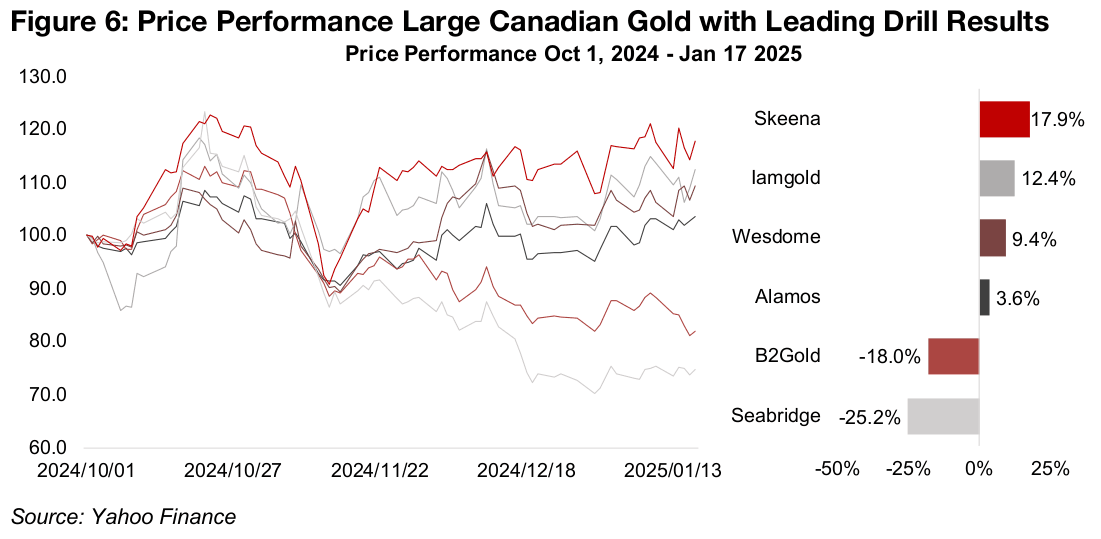
Snowline, New Found and Amex down even as drill results remain robust
Some of the strongest recent drill results for the Canadian juniors have come from
Snowline Gold, New Found Gold and Amex Exploration, which all have a long track
record of consistent high grade results over the past several years. Snowline and New
Found’s strong gold grades have propelled their market caps to CAD$843mn and
CAD$499mn, respectively, even both are still in the earlier stages of exploration
(Figure 7).
Snowline released an initial resource estimate for its Rogue project in mid-2024, with
4.0 mn oz in Indicated Resources at a 1.66 g/t Au grade and 3.3mn oz in Inferred
Resources at a 1.25 g/t Au grade. New Found Gold has still not released an initial
resource estimate for its Queensway project, but targets completion of this by Q2/25.
Amex has a considerably lower market cap than these two of CAD$131mn given a
smaller resource for its Perron project of 0.5mn oz Au M&I and 1.05 mn oz Au Inferred,
although at very high grades of 4.3 g/t Au and 3.8 g/t Au, respectively.
Snowline, New Found’s and Amex’s major drill results are all from their flagship
projects. Snowline reported the strongest result of the three, with a grams-thickness
of 910 with 2.1 g/t Au over 433.5 m, and New Found announced a grams-thickness
of 738 with a similar grade of 2.2 g/t Au over 343.1 m (Figure 8). Amex’s major drill
result had a grams-thickness of 242, with a very high 134.4 g/t Au grade but over only
1.8 m. The strong drill results have not driven an increase in the share prices of these
companies since October 2024, with Snowline, New Found and Amex down -6.0%,
-9.2% and -30.1%, respectively (Figure 9).
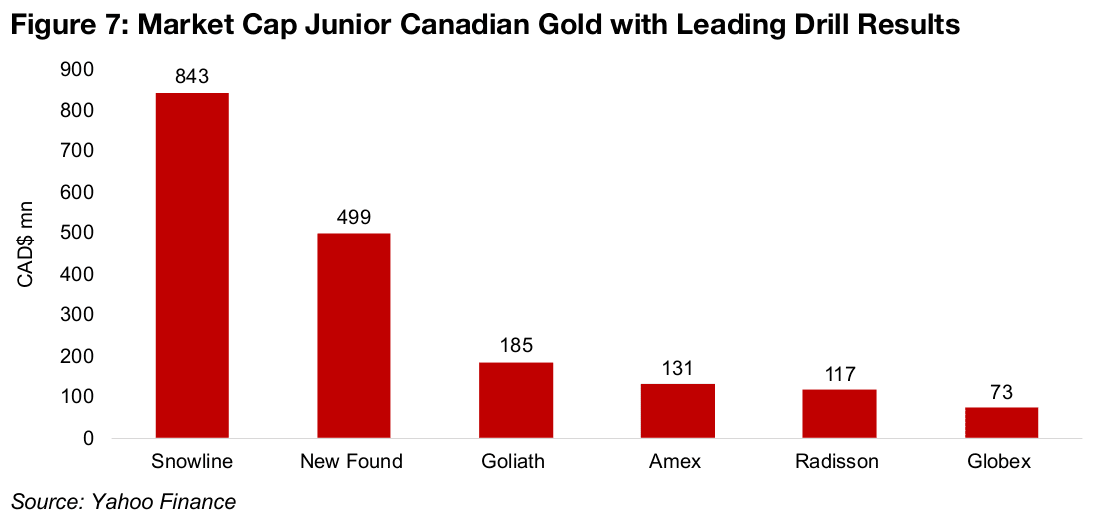
All three of these companies are facing an issue typical of junior miners with an extended exploration phase that has been particularly successful. The market will have come to expect continued strong drill results from these companies given the previous track record of the projects, and already priced this into share prices. To boost the market cap further, the companies generally need to show that they advancing into the development phase and give the market more clarity on the expected output and costs of an actual mine. This will partly explain while the share prices will have lagged for these companies even as they continue to release outstanding drill results.
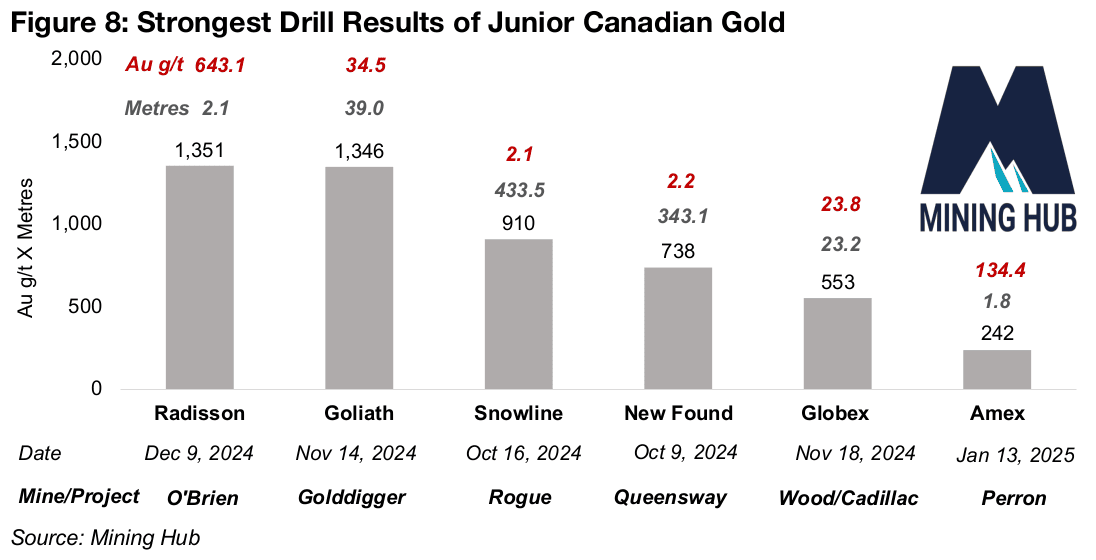
Smaller caps Radisson, Goliath, Globex propelled by strong drill results
The other three Canadian juniors with leading drill results, Radisson, Goliath and
Globex, developing the O’Brien, Golddigger and Wood/Central Cadillac projects,
respectively, are in an earlier phase of exploration for their major projects where these
releases can still have a substantial effect on their share prices. This occurs as strong
drill results for a given project suddenly start to present a more concrete reality to the
market for what was previously mainly only a thesis backed by relatively limited
physical evidence.
This can lead to a major increase in the probability of a significant resource that is
priced in by the market over a relatively short period. This in turn can drive some of
the highest and fastest percentage gains in market cap that a junior is likely to ever
see, often rising four or five times from US$10-US$20mn to US$100mn. The next
potential doubling or tripling again to the US$300mn level or higher often requires
entering the long process of development.
The strongest recent results from Radisson and Goliath and have had a similar grams-
thickness, at 1,351 and 1,346, but the former has a much higher grade of 643.1 g/t
Au over a lower width of 2.1 m and the latter a grade of 34.5 g/t Au over 39.0 m. While
Globex’s drill results gram-thickness has been towards the bottom of the group, at
553 with 23.8 g/t Au over 23.2 m, it has seen the strongest share price gains of the
group, up of 47.7%, as it still in the early phases of the potential move outlined above,
with a market below CAD$100mn.
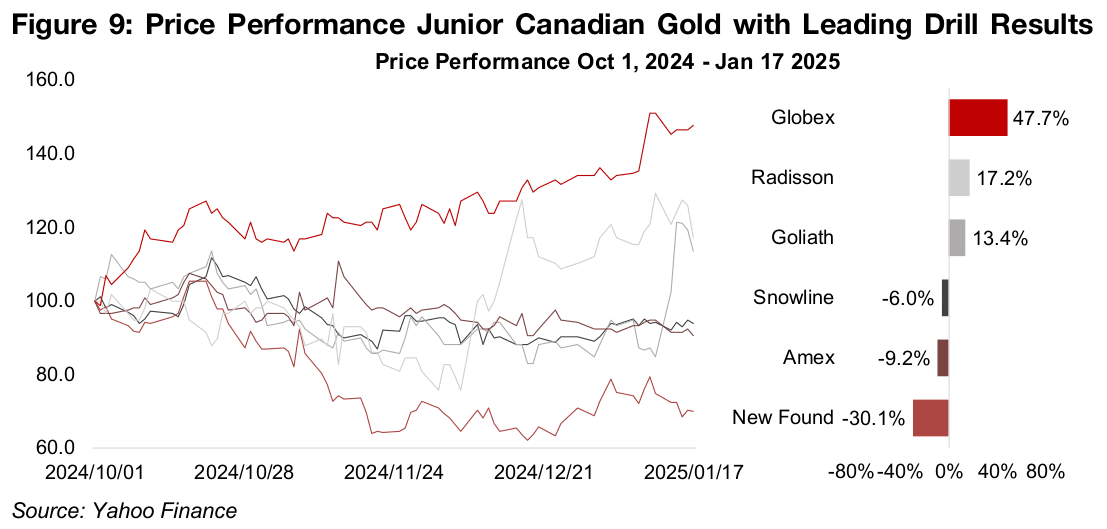
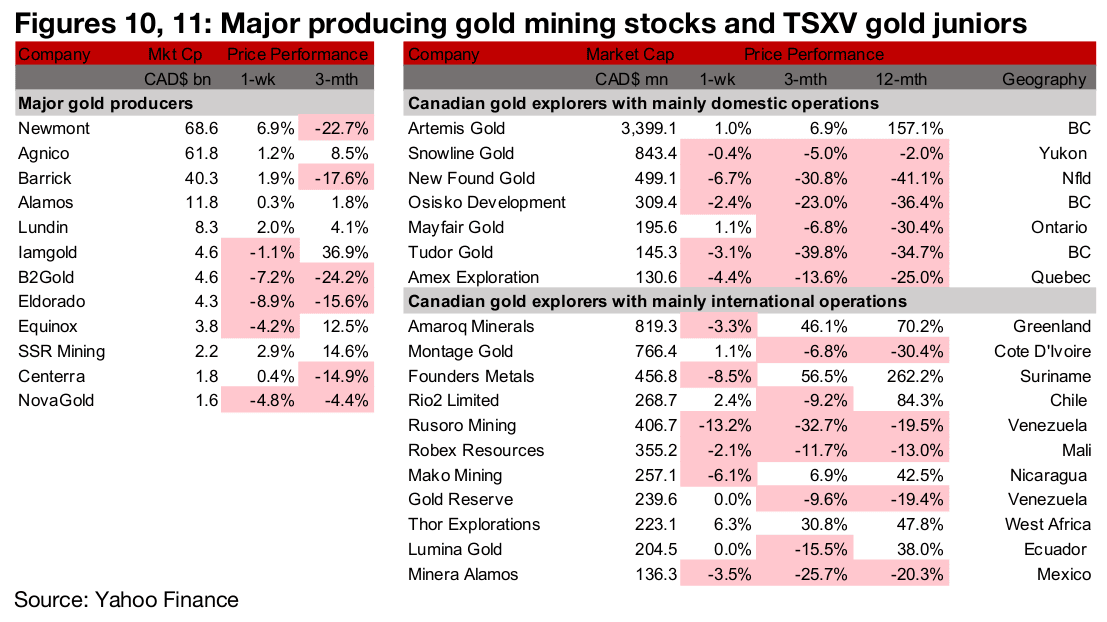
Large producers and TSXV gold mixed
The largest gold producers rose but most mid-tier gold majors declined and TSXV gold was mixed (Figures 10, 11). For the TSXV gold companies operating domestically, Tudor Gold initiated a permitting process for construction of underground development for exploration of Supercell One at Treaty Creek (Figure 12). For the TSXV gold companies operating internationally, Robex Resources reported an updated Feasibility Study for Kineiro, Thor Explorations and Mako Mining reported Q4/24 production and Rio2 Limited provided an update on construction at the Fenix mine (Figure 13).

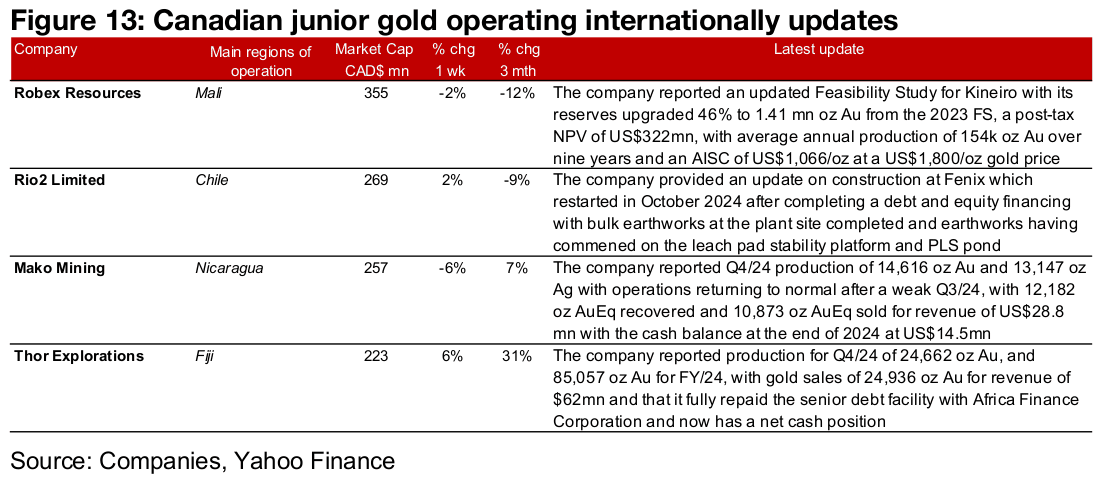
Disclaimer: This report is for informational use only and should not be used an alternative to the financial and legal advice of a qualified professional in business planning and investment. We do not represent that forecasts in this report will lead to a specific outcome or result, and are not liable in the event of any business action taken in whole or in part as a result of the contents of this report.


